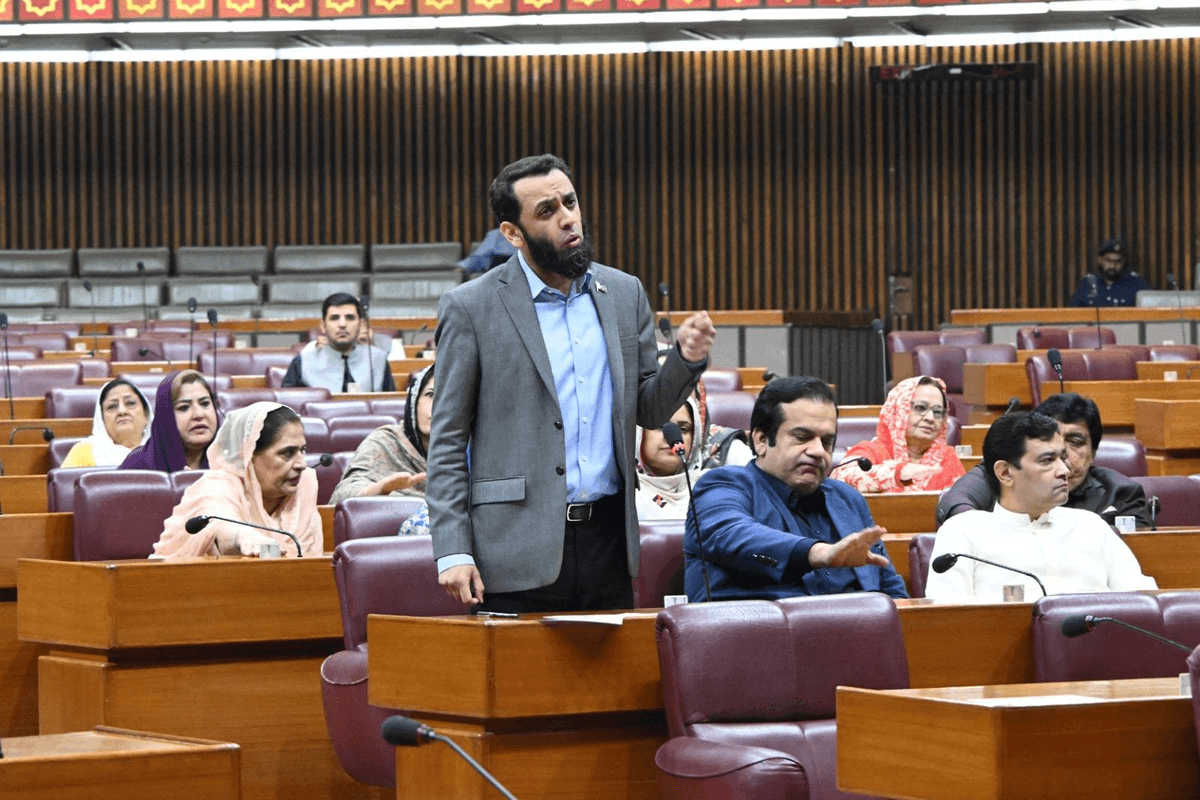News Desk
The News Desk provides timely and factual coverage of national and international events, with an emphasis on accuracy and clarity.

Pakistan’s Information Minister Ata Tarar speaks during the National Assembly session on Thursday.
@NationalAssemblyOfPakistan/Facebook
Pakistan’s Information Minister Ata Tarar claimed Thursday that 40 to 50 Indian soldiers were killed in recent clashes along the Line of Control (LoC), signaling a sharp escalation in tensions between the two nuclear-armed neighbors.
Addressing the National Assembly, Tarar said Indian forces had suffered “huge losses” and that Pakistani forces had destroyed a brigade headquarters across the LoC.
“This is a major success in conventional warfare. Blowing up a brigade headquarters is no small feat,” he told lawmakers in the lower house of parliament.
Tarar’s remarks follow Pakistan’s earlier claim that it had shot down 25 Indian drones over the past 24 hours. The minister said India began deploying unmanned aerial vehicles after sustaining heavy losses in direct engagements.
“They’ve resorted to drones after being pushed on the back foot, perhaps because their pilots are now reluctant to face further humiliation on foreign soil,” he said. “Let me tell you, it’s not the aircraft but the courage of the pilot that defines a mission.”
He described India as a “coward enemy” and identified the downed drones as Israeli-made Harop loitering munitions—calling them the “Rafale of drones” in terms of firepower and precision.
Tarar claimed Pakistan initially brought down five drones before targeting and destroying a total of 25.
India claims it thwarted Pakistani attacks
As Pakistan claims to have inflicted a significant defeat on India in response to fresh hostilities, the Indian Defense Ministry has presented a contrasting account of events.
In a statement issued Thursday, the Indian Defense Ministry said it had "neutralized" Pakistani attempts to engage multiple military targets across India's northern and western sectors on Wednesday night. It further claimed that Indian forces targeted Pakistani air defense radars and systems at several locations in retaliation.
Responding to the Indian statement, Tarar maintained that the Indian attack was launched "under the cover of darkness," but ended in a “crushing defeat” for New Delhi.
‘Broke India’s military pride’
“India boasts of superior military technology, like Rafale jets, but our armed forces have shattered that arrogance,” Tarar said. He claimed that the morale of Indian forces collapsed after their aircraft were brought down.
Tarar alleged that India has now shifted its approach after aerial setbacks and is increasingly relying on Israeli-made Harop drones. “We’ve shot down 25 of their drones so far. This is a clear testament to the effectiveness of Pakistan’s air defense system,” he said, adding that the remains of the downed drones will be displayed in museums as proof of Pakistan’s defensive capabilities.
He further accused India of using false flag operations -- such as those in Pulwama and Pahalgam -- as pretexts for aggression, while refusing to allow independent investigations or present credible evidence.
The minister stressed that Pakistan’s National Security Committee has given the armed forces full authority to respond forcefully to any future Indian provocations. “We will not tolerate cross-border violations. India may have initiated this conflict, but we will decide how and when it ends,” he warned.
Calling India a “cowardly enemy,” Tarar said Pakistan’s unity and resolve remained firm. “Our defense lies in the strongest hands, and our armed forces have once again demonstrated their superiority in conventional warfare.”
Tensions rise after Kashmir attack
The latest surge in tensions between India and Pakistan follows a deadly attack on April 22 in the Pahalgam area of Kashmir, where 24 tourists -- mostly Indian nationals -- were killed by unidentified gunmen. While investigations are still ongoing, India swiftly blamed Pakistan for the assault. Islamabad, however, has firmly denied the allegation, citing a lack of evidence and calling for an independent, impartial inquiry.
In retaliation, New Delhi suspended the Indus Waters Treaty—a landmark agreement in place since 1960—and ordered Pakistani nationals to leave India within 48 hours. Pakistan condemned the moves as provocative and unlawful, warning that any attempt to unilaterally alter the treaty would amount to “an act of war” and would be met with strong resistance.
Further raising concerns, Indian Prime Minister Narendra Modi granted the military “operational freedom” following the attack, fueling fears of a potential armed conflict. Pakistan, while reiterating its desire for peace, has said that any hostile act will be met with a firm and lawful response.
Kashmir, a Muslim-majority region, has remained a flashpoint between India and Pakistan since their independence in 1947. Both countries control parts of the disputed territory but claim it in full.
An armed insurgency has raged in the Indian-administered region since 1989, with rebel groups seeking either independence or a merger with Pakistan. India frequently accuses Pakistan of backing the militants, a charge Islamabad denies, insisting it provides only diplomatic and moral support for Kashmir’s right to self-determination while condemning alleged human rights abuses in the region.







Comments
See what people are discussing